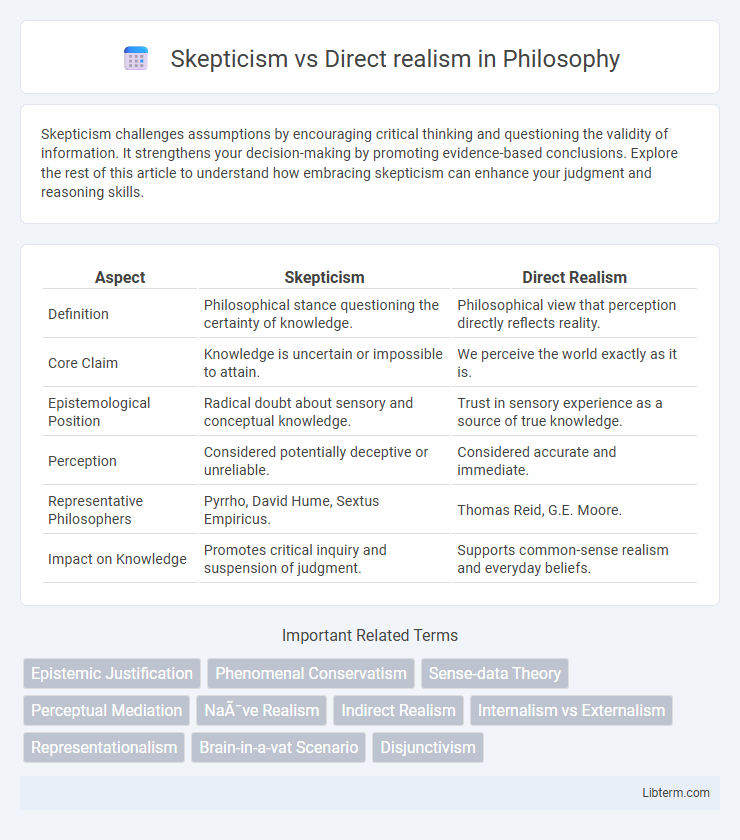Skepticism challenges assumptions by encouraging critical thinking and questioning the validity of information. It strengthens your decision-making by promoting evidence-based conclusions. Explore the rest of this article to understand how embracing skepticism can enhance your judgment and reasoning skills.
Table of Comparison
| Aspect | Skepticism | Direct Realism |
|---|---|---|
| Definition | Philosophical stance questioning the certainty of knowledge. | Philosophical view that perception directly reflects reality. |
| Core Claim | Knowledge is uncertain or impossible to attain. | We perceive the world exactly as it is. |
| Epistemological Position | Radical doubt about sensory and conceptual knowledge. | Trust in sensory experience as a source of true knowledge. |
| Perception | Considered potentially deceptive or unreliable. | Considered accurate and immediate. |
| Representative Philosophers | Pyrrho, David Hume, Sextus Empiricus. | Thomas Reid, G.E. Moore. |
| Impact on Knowledge | Promotes critical inquiry and suspension of judgment. | Supports common-sense realism and everyday beliefs. |
Introduction to Skepticism and Direct Realism
Skepticism challenges the certainty of our knowledge by questioning the reliability of sensory experiences and the existence of an objective reality. Direct realism, also known as naive realism, asserts that the world is perceived exactly as it is, with objects existing independently and our senses providing immediate awareness of them. These contrasting views form a fundamental debate in epistemology, addressing how humans attain and validate knowledge about the external world.
Defining Skepticism: Core Concepts
Skepticism challenges the certainty of knowledge, emphasizing doubt about the reliability of sensory experiences and the existence of an external world. It questions whether perceptions correspond accurately to reality or are merely mental constructs, highlighting problems such as the illusion and the problem of induction. Central to skepticism is the idea that true knowledge requires beyond perceptual evidence, fostering ongoing inquiry into epistemological foundations.
Understanding Direct Realism
Direct Realism asserts that the world is perceived exactly as it is, with objects existing independently and their properties directly accessible to our senses. This theory opposes Skepticism, which questions the reliability of sensory knowledge and posits that perception may not reflect external reality accurately. Understanding Direct Realism involves recognizing the confidence it places in immediate sensory experience as a valid and truthful connection to the external environment.
Historical Roots of the Debate
The historical roots of the debate between skepticism and direct realism trace back to ancient Greek philosophy, with Plato's allegory of the cave illustrating early skeptical views on perception's reliability. Descartes' methodological doubt in the 17th century furthered skepticism by questioning the certainty of sensory knowledge, challenging the direct realist assertion that perception grants immediate access to reality. This philosophical tension persisted through the works of Locke, Berkeley, and Hume, who contributed foundational ideas about perception, reality, and knowledge that continue to shape contemporary discussions on direct realism and skepticism.
Key Philosophers and Their Perspectives
Rene Descartes, a pivotal skeptic, questioned the certainty of sensory knowledge, emphasizing doubt as a path to truth, while G.E. Moore championed direct realism, asserting that common sense and perceptual experience provide immediate knowledge of the external world. David Hume contributed to skepticism by highlighting the limitations of human perception and the problem of inductive reasoning, contrasting with J.J. Gibson, who developed the ecological approach to perception supporting direct realism. These philosophers' contrasting perspectives underscore the enduring debate on whether sensory experience reveals reality directly or if knowledge is fundamentally uncertain.
Central Arguments for Skepticism
Skepticism challenges the reliability of sensory perception by arguing that our senses can deceive us, making it impossible to know the external world with certainty. Central arguments for skepticism include the "brain in a vat" scenario and the problem of hallucinations, which suggest that all experiences could be illusions. This position contrasts with direct realism, which claims that perception grants immediate and accurate access to the external world.
Main Defenses of Direct Realism
Direct realism is primarily defended by emphasizing the immediate nature of perception, arguing that we perceive the external world directly without intermediaries such as sense data or representations. Proponents highlight the coherence and consistency of everyday experiences as evidence that objects exist independently and are perceived as they truly are. Empirical support from perceptual psychology and neuroscience reinforces this stance by demonstrating how sensory input correlates closely with environmental stimuli, challenging the skeptical claim that perception is inherently deceptive.
Criticisms of Skepticism
Skepticism faces criticism for undermining the reliability of sensory experiences, which direct realism upholds as accurate representations of the external world. Critics argue that skepticism leads to an impractical doubt, making everyday knowledge and scientific inquiry impossible. This challenges skepticism's claim that knowledge of the external world is fundamentally uncertain, emphasizing instead the coherence and consistency of perceptual experiences endorsed by direct realism.
Challenges Facing Direct Realism
Direct realism faces challenges such as the problem of perceptual illusions and hallucinations, which suggest that our sensory experiences may not always correspond to external reality. The argument from the possibility of error highlights that our perceptions can be mistaken, undermining the direct realist claim that we perceive the world unmediated. Skepticism challenges direct realism by emphasizing these discrepancies, questioning whether we can ever have certain knowledge of the external world through perception alone.
Contemporary Relevance and Future Directions
Skepticism challenges the certainty of direct realism by questioning our ability to perceive an objective reality, influencing contemporary debates in epistemology and cognitive science. Direct realism maintains that perception provides immediate access to the world, shaping developments in virtual reality and AI where accurate representation of reality is crucial. Future directions involve integrating neuroscientific findings to resolve perceptual ambiguities and enhance human-computer interaction, bridging gaps between subjective experience and objective data.
Skepticism Infographic

 libterm.com
libterm.com